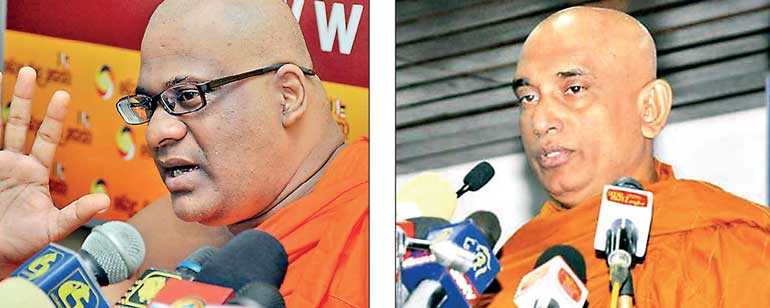Tuesday Feb 17, 2026
Tuesday Feb 17, 2026
Tuesday, 11 June 2019 00:00 - - {{hitsCtrl.values.hits}}

Rathana and Gnanasara Theros are back. They were almost forgotten in recent times and with the Presidential Election close by, an opportunity has been presented to them to be in the limelight again. As we tend to have short memories, it is worthwhile reminding ourselves of the roles these two individuals played in 2014.
Roles of Rathana and Gnanasara Theros in 2014
Prior to the previous Presidential Election, these two individuals played critical roles in 2014. Gnanasara Thero was a central figure in the riots against Muslims in Aluthgama and Beruwala in 2014. He was seen on video instigating hatred. He was believed to be part of the then Government. The end result was the Muslims going en masse to vote against the then Government at the Presidential Election in 2015. Did the new Government take any action against him? No. It was for a different ‘contempt of court’ case that he was jailed only last year – almost to make him more eligible when he returns from jail (which he did in a matter of few months). 
Rathana Thero on the other hand projected himself as a crusader against corruption (an almost forgotten topic now) in 2014. He and his colleagues made people believe that it was them who won the war against LTTE by pushing the former President to war. In the end, he managed to break sufficient Sinhala, Buddhist votes to tilt the balance of the Presidential Election.
Although it was not clear at that time, in hindsight, these two individuals have worked towards the same end result, from seemingly opposite sides.
Setting stage for 2019 Presidential Election
With the Presidential Election a few months away, the emergence of these individuals may not be an accident. The 21 April incident has been exploited by these individuals (and whatever the forces who are behind them) to make a comeback from oblivion and rejection from the public.
On one hand Gnanasara Thero is justifying his hatred and claims he warned us about the 21 April attack. His jail term could further boost his image as a hero. On the other hand, Rathana Thero is doing a fast-unto-death, claiming he’s the saviour of the Sinhala Buddhists.
Meaningless slogans
What’s this hunger strike for? To remove Bathiudeen from his Minister post and Hizbullah and Salley from Governor posts.
To start with, both Hizbullah and Salley were recently appointed by the President. Instead of a public hunger strike, that could have been settled through a discussion with the President. As for Bathiudeen, he only commands five MPs in the Parliament, so it’s difficult to think that he is so powerful to avoid an impartial investigation. Clearly the Government wouldn’t fall by the absence of those five votes. The Presidential and Parliamentary Elections are only a few months away and all these individuals would be out of office anyway. Hence the question arises as to why should there be such a glorified effort to remove them when they will anyway be removed in a few months? Frankly, there are more serious issues affecting Sri Lanka right now, and it seems interested parties are trying to make other issues more important in the eyes of the public.
A fast to destabilise the country
In the aftermath of the 21 April tragedy, the security forces did a commendable job to improve the security situation of the country. As this column highlighted, the political and religious leaders were not equally swift to ease the tensions at grassroot levels, which resulted in unrest many weeks after the incident.
However that situation is also contained in recent weeks. As the country was slowly getting back to normalcy, this fast-unto-death is helping to increase the tensions among communities again. And the purpose of this action, as mentioned earlier, is questionable at best.
Trap for major political parties
One could sense a trap being set for the Presidential Election, both for the major political parties and the voting public.
Any major political party that is seemingly connected to these controversial monks would almost certainly alienate the minority vote (Muslim, Tamil, etc.) at the election. That would be costly. Even if the major political parties refrain from associating with these individuals, these individuals could come from a third party claiming they are the true guardians of the Sinhala, Buddhists. The intention would be to break sufficient votes from the Sinhala Buddhist voter base to tilt the election result. The slogan ‘hunger for power of both major political parties would prevent action against Muslim politicians’ could very well gain traction among the urban voters in the current environment.
The challenge for the urban voter
Therefore, the voting public needs to be alert and wise. One needs to carefully identify the vociferous actors who emerge prior to elections and virtually disappear thereafter, and do not take responsibility for their actions. The country would be much safer in the hands of people who would talk and promise less but would make the deeds speak for itself.
The country’s single biggest issue right now is its falling economy. Given a free hand, the security forces are more than capable of keeping the country safe. The challenge for the voter is not to go along racial or religious lines, but to support the person or the team who could solve the economic problems which would eventually unite the country.
(The writers could be contacted via [email protected].)